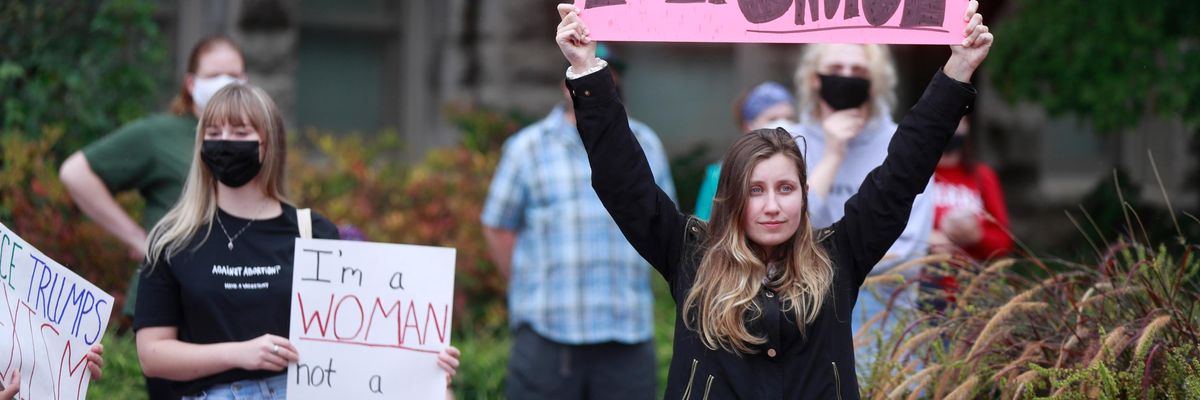Earlier this year, a small group of women and I gathered to post artwork around Washington, D.C. We were celebrating the 49th anniversary of Roe v. Wade, which protected women's constitutional access to abortion.
That day, we learned that the state would apparently step in to protect a lamp post from a poster, but would not protect women from having their bodily autonomy violated.
As the conservative Supreme Court considers new anti-Roe cases and state legislatures rush to pass harsh new restrictions, Roe may not make it to its 50th anniversary. So we wanted to advocate for continued access to reproductive health care.
What followed was an intense interaction with Capitol Police, who accused us of "defacing" federal property simply for putting posters on lamp posts. They forced us to retrace our steps and scrape down each poster--including some we hadn't even put up. It was humiliating, but we cooperated to avoid arrest.
Along the way, the officers kept reminding us of their oath to "defend the Constitution"--even as they repeatedly threatened us with jail time for expressing our First Amendment rights to free expression and peaceful assembly. (And isn't abortion a constitutional right, too?)
"Ladies, I hope this is a huge life lesson," one officer told us at the end as he glared at us. "Because if we see you down here doing this again, you will be arrested, no questions asked."
He was right about one thing: It was a life lesson. That day, we learned that the state would apparently step in to protect a lamp post from a poster, but would not protect women from having their bodily autonomy violated.
The aggressive behavior by those officers parallels the militant anti-abortion bans that could sweep the nation if Roe is overturned.
In Texas, a new law prohibits abortions starting at six weeks of pregnancy. That's well before a detectable heartbeat--and well before many women even know they're pregnant. Shockingly, the law also offers $10,000 incentives to private citizens to sue any women, medical professionals, or friends and family members who "aid and abet" an abortion.
In Mississippi, meanwhile, a new law bans abortions entirely after 15 weeks. As the case goes to the Supreme Court, the state is arguing that it has a "legitimate government interest" in banning the procedure, so the Constitution can't restrict the state's ability to it.
Meanwhile, at least 21 states have laws in place to restrict or ban abortion if Roe is overturned.
Already, extremist laws like these are having an impact. According to the Texas Health and Human Services commission, abortions in Texas fell by 60 percent in the first month after the new law's passage.
Neighboring states such as my home state, New Mexico, have seen a surge of Texans seeking help and services. New Mexican funds that support health care costs, gas, food, and child care for patients seeking abortions are reporting that their resources are being taxed by the extra demand.
The criminalization of abortion only accelerates the inequities faced by marginalized communities. Nearly half of women who get abortions live below the poverty line, but in much of the country--especially the South and Midwest--they're losing access to it.
Nearly 60 percent of Americans oppose overturning Roe--roughly twice as many who support overturning it. Most of us are firmly against these radical restrictions that undermine women's access to safe reproductive care, which will force women to seek illegal and unsafe care instead.
That means we're going to have to speak up, which isn't always easy. I found out firsthand when a police officer forced me to scrape down a poster quoting bell hooks that "women should have the right to choose."
But I'll keep fighting to protect our bodily autonomy, economic rights, and participation in our democracy. I hope you will too.

